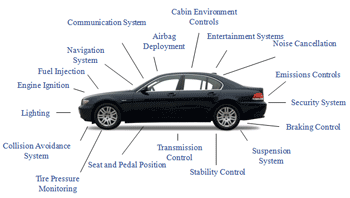Vehicle Electronics - ECE 470
Description
 This course provides an overview of
the primary electronic systems found in automotive
designs including critical systems such as power
train control, steering and braking as well as
emissions control, navigation, driver interface,
entertainment and communication systems. The course
covers automotive communication networks and
protocols, power distribution and hybrid system
controls. Students will learn to use on-board
diagnostics to communicate with the electronic
systems in an automobile and extract essential
system performance information. The course also
reviews trends in automotive electronics as well as
issues (such as cost, reliability and systems
integration) that are driving the industry. This course provides an overview of
the primary electronic systems found in automotive
designs including critical systems such as power
train control, steering and braking as well as
emissions control, navigation, driver interface,
entertainment and communication systems. The course
covers automotive communication networks and
protocols, power distribution and hybrid system
controls. Students will learn to use on-board
diagnostics to communicate with the electronic
systems in an automobile and extract essential
system performance information. The course also
reviews trends in automotive electronics as well as
issues (such as cost, reliability and systems
integration) that are driving the industry.
Course Objectives
- Students will become familiar with the various electronic components and systems in a typical automobile.
- Students will become familiar with the various automotive communication busses and be able to select an appropriate bus for a particular application.
- Students will learn to obtain information about a vehicle’s status or performance by monitoring the various communications busses.
- Students will become familiar with automotive design and development cycles and how vehicle electronics fits in to this process.
- Students will learn to recognize factors that are likely to impact the cost and reliability of electronic components.
Course Topics
- Overview of vehicle electronic systems
- Automotive electronic components, sensors and actuators
- Automotive Communication Busses – CAN, MOST, …
- Electric power generation and distribution
- Electronic system design and modeling
- Electronics testing and troubleshooting
- Electromagnetic compatibility
- Process Chain from an OEM’s perspective
- Process Chain from a supplier’s perspective.
- Future Directions in Electronic systems integration.
Schedule
This 3-credit graduate course is part of the Electrical and Computer Engineeering Technical Elective Track in Electric Vehicles.
More Information
If you have questions about this course, contact Prof. T. Hubing
(hubing @clemson.edu).
|

 This course provides an overview of
the primary electronic systems found in automotive
designs including critical systems such as power
train control, steering and braking as well as
emissions control, navigation, driver interface,
entertainment and communication systems. The course
covers automotive communication networks and
protocols, power distribution and hybrid system
controls. Students will learn to use on-board
diagnostics to communicate with the electronic
systems in an automobile and extract essential
system performance information. The course also
reviews trends in automotive electronics as well as
issues (such as cost, reliability and systems
integration) that are driving the industry.
This course provides an overview of
the primary electronic systems found in automotive
designs including critical systems such as power
train control, steering and braking as well as
emissions control, navigation, driver interface,
entertainment and communication systems. The course
covers automotive communication networks and
protocols, power distribution and hybrid system
controls. Students will learn to use on-board
diagnostics to communicate with the electronic
systems in an automobile and extract essential
system performance information. The course also
reviews trends in automotive electronics as well as
issues (such as cost, reliability and systems
integration) that are driving the industry.